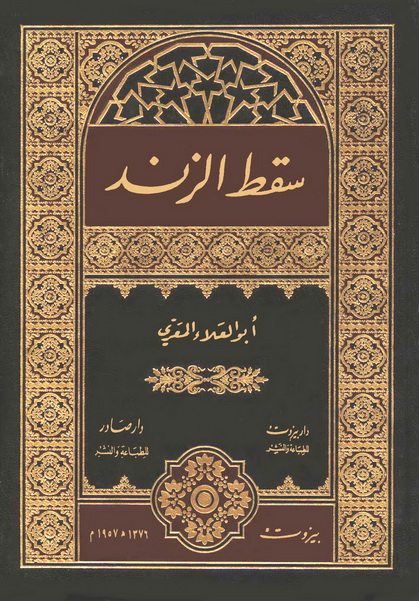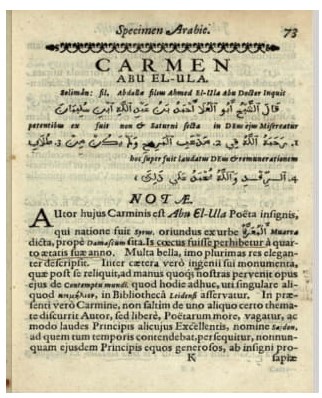Saqt az-Zand on:
[Wikipedia]
[Google]
[Amazon]
 ''Saqt az-Zand'' ( ar, سقط الزند, saqṭ az-zand; also transliterated as ''Sikt al-Zand'' and translated as ''The Spark of the Fire Stick'' or ''The Falling Spark of Tinder'') was the first collection of poetry by
''Saqt az-Zand'' ( ar, سقط الزند, saqṭ az-zand; also transliterated as ''Sikt al-Zand'' and translated as ''The Spark of the Fire Stick'' or ''The Falling Spark of Tinder'') was the first collection of poetry by
 The Dutch Arabist
The Dutch Arabist
digital version of Fabricius' ''Specimen Arabicum'' with an extract from ''Saqt az-Zand'' (p. 85)digital version of a manuscript of Al-Tabrizi's commentary on ''Saqt az-Zand''digital version of Dhou as-Saqt
 ''Saqt az-Zand'' ( ar, سقط الزند, saqṭ az-zand; also transliterated as ''Sikt al-Zand'' and translated as ''The Spark of the Fire Stick'' or ''The Falling Spark of Tinder'') was the first collection of poetry by
''Saqt az-Zand'' ( ar, سقط الزند, saqṭ az-zand; also transliterated as ''Sikt al-Zand'' and translated as ''The Spark of the Fire Stick'' or ''The Falling Spark of Tinder'') was the first collection of poetry by Al-Ma'arri
Abū al-ʿAlāʾ al-Maʿarrī ( ar, أبو العلاء المعري, full name , also known under his Latin name Abulola Moarrensis; December 973 – May 1057) was an Arab philosopher, poet, and writer. Despite holding a controversially irreli ...
. It consists of seventy-four qasida
The qaṣīda (also spelled ''qaṣīdah''; is originally an Arabic word , plural ''qaṣā’id'', ; that was passed to some other languages such as fa, قصیده or , ''chakameh'', and tr, kaside) is an ancient Arabic word and form of writin ...
s amounting to over three thousand lines, written in his youth and early adulthood, before the year 1020.
Literary themes, style and language
The qasida form was a very common one in Arab poetry and one of its purposes was to serve as a vehicle for the praise of a patron or some other notable man. Al-Maarri’s earlier qasidas conformed to this tone and style, and were also notable for their undertone of Shia values. His work included an elegy on his late father. praise forSa'd al-Dawla
Abu 'l-Ma'ali Sharif, more commonly known by his laqab, honorific title, Sa'd al-Dawla ( ar, سعد الدولة), was the second ruler of the Hamdanid Emirate of Aleppo, encompassing most of northern Bilad al-Sham, Syria. The son of the emirate' ...
, various notables of Aleppo
)), is an adjective which means "white-colored mixed with black".
, motto =
, image_map =
, mapsize =
, map_caption =
, image_map1 =
...
and librarians of Baghdad. It included his reactions to political events in contemporary Syria. He praised important individuals on all sides of the various conflicts that beset his homeland, including the Fatimid general Bandjutakin.
The ''Saqt as-Zand'' collection achieved great popularity when it was circulated in Baghdad
Baghdad (; ar, بَغْدَاد , ) is the capital of Iraq and the second-largest city in the Arab world after Cairo. It is located on the Tigris near the ruins of the ancient city of Babylon and the Sassanid Persian capital of Ctesiphon ...
. Although it occupies a central place in the canon of Arabic literature it is relatively unknown to readers who do not speak the language, perhaps because of the extraordinary difficulty of translating its dense, erudite verse. The title of the collection itself poses challenges of comprehension and translation. 'Saqt' means 'spark' but the more usual meaning is 'falling', evoked in the English translation 'The Falling Spark of the Tinder'. A 'zand' was a fire drill
A fire drill is a method of practicing how a building would be evacuated in the event of a fire or other emergencies. In most cases, the building's existing fire alarm system is activated and the building is evacuated by means of the nearest a ...
; the commentator Al-Khwarazimi said that title was an allusion to the effort required to grasp the meaning of the verses, similar to the effort involved in producing fire from friction between two pieces of wood.
The most important elements in this work are Al-Ma'arri's maxims and his reflections on life and death, on human nature and aspirations, and on his own life and its contradictions. The collection did not however display the intense philosophy and erudition of Al-Ma’arri’s later work, the ''Luzūmiyyāt
The ''Luzūmiyyāt'' ( ar, اللزوميات) or ''Luzūm mā lā yalzam'' ( ar, لزوم ما لا يلزم) is the second collection of poetry by Al-Ma'arri, comprising nearly 1600 short poems organised in alphabetical order and observing a no ...
''. Rather this early poetry was more sensitive and personal, full of vigour and virtuosity with elements of riddle and wordplay.
In the preface to the work, the ''Khutbat Saqt al-Zand'', Al-Ma’arri stated that he had not composed poetry with the aim of obtaining reward and expressed his reservations about the traditional praise function of the qasida. Because the qasida form demanded a ‘madih’ (praise) section, he stated that he had included these as technical exercises and tests of his talent. He believed that abundant praise was rightly due to God and not to any man. The work shows the influence of Al-Mutanabbi
Abū al-Ṭayyib Aḥmad ibn al-Ḥusayn al-Mutanabbī al-Kindī ( ar, أبو الطيب أحمد بن الحسين المتنبّي الكندي; – 23 September 965 AD) from Kufa, Abbasid Caliphate, was a famous Abbasid-era Arab poet at th ...
.
The final poem in the collection is his ''Farewell Ode'', in which Al-Ma’arri said goodbye to his admirers in Baghdad and expressed his regret at his failure to establish himself there as he had hoped to do, before returning to his hometown of Ma'arrat al-Nu'man
, timezone = EET
, utc_offset = +3
, timezone_DST = EEST
, utc_offset_DST = +2
, blank_name = Climate
, blank_info = BSk
, coordinates=
, e ...
.
In Ma’arrat al-Nu’man there is a marble monument to Al-Ma’arri on which is carved a verse from ''Saqt az-Zand'': "Let the rain refrain from watering me and my land, if its clouds do not cover the whole country”. This line is preceded by another in the same vein: "If immortality had been offered to me exclusively, I would not have accepted to be the sole beneficiary.”
Reception and critical scholarship in the Arab world
The first scholarly study of ''Saqt as-Zand'' was undertaken by Al-Ma’arri himself. After his return to Ma'arra and his self-isolation, he worked on a critical commentary of his youthful work. This commentary, known as ''Dhou as-Saqt'' (ضوءالسقط or “The Light of the Spark”) was dictated to his amanuensis Aboû Zakaryâ at-Tabrîzî, but never put into circulation. The young Tabrizi, drawn to Al-Ma’ari by his desire to learn from the author of ''Saqt as-Zand'', later made a new, much larger commentary of his own. It is this commentary which was later published under the title of ''Sharh at-Tanwīr ‘ala Saqt az-Zand'' (“Explanation of the Enlightenment of Saqt az-Zand”) inBoulaq
Boulaq ( ar, بولاق, Būlāq from "guard, customs post"), is a district of Cairo, in Egypt. It neighbours Downtown Cairo, Azbakeya, and the River Nile.
History
The westward shift of the Nile, especially between 1050 and 1350, made land ava ...
in AH 1286 (1869-70 CE).
Known historic commentaries on ''Saqt as-Zand'' are:
*Al-Ma’arri’s own commentary ''Dhou as-Saqt''
*the improved version by Abu Zakariya Yahya ibn Ali Al-Tabrizi
*commentary by Al-Batalyawsi (d.527/1227)
*”ضرام السقط” (“Dirām as-Saqt” or “Igniting the Spark”) by Sadr al-Afdal Qasim ibn Husain al-Khwarazimi (d.617/1220)
*”التنوىر على سقط الرند” (“At-Tanwīr ‘ala Saqt az-Zand” or “The Enlightenment of Saqt az-Zand”) by Al-Khuwwi Al-Nahwi (c.532/1137)
*Commentary on the armour-poems in ''Saqt az-Zand'' by Al-Qādisi (1075/1665)
*شرح القصيدة اللامية (”Sharh al-Qasida al-lāmiya” or “Explanation of the Shining Qasida”) by Ibn al-Azm (1285/1868)
In addition scholars across the Arab world held ''Saqt az-Zand'' in high regard. For example the work was discussed in the ''Fihrist'' of Ibn Khayr al-Ishbili (d. 1200), while poet and historian Ibn Bassām al-Shantarīnī (d. 1147) cited it extensively in his “Al-Dhakhīra fī mahāsin ahl al-jazīra” (Treasury of the Merits of the Folk of the berianPeninsula).
Early European scholarship
 The Dutch Arabist
The Dutch Arabist Erpenius
Thomas van Erpe, also known as Thomas Erpenius (September 11, 1584November 13, 1624), Dutch Orientalist, was born at Gorinchem, in Holland. He was the first European to publish an accurate book of Arabic grammar.
After completing his early educa ...
and his pupil Jacobus Golius
Jacob Golius born Jacob van Gool (1596 – September 28, 1667) was an Orientalist and mathematician based at the University of Leiden in Netherlands. He is primarily remembered as an Orientalist. He published Arabic texts in Arabic at Leiden, ...
collected manuscripts, and Golius purchased a copy of ''Dhou as-Saqt'', now held in the collections of the University of Leiden
Leiden University (abbreviated as ''LEI''; nl, Universiteit Leiden) is a public research university in Leiden, Netherlands. The university was founded as a Protestant university in 1575 by William, Prince of Orange, as a reward to the city of Le ...
. He also published a few short extracts of Al-Ma’arri’s work in his 1656 edition of Erpinius’ work on Arabic grammar. The first publication of selections from ''Saqt az-Zand'' in a European scholarly work was in the collection ''Specimen Arabicum'', a 1638 anthology of Arabic literature by Johann Fabricius published in Gdansk.
The work that brought ''Saqt az-Zand'' to the attention of a wider European audience was Silvestre de Sacy
Antoine Isaac, Baron Silvestre de Sacy (; 21 September 175821 February 1838), was a French nobleman, linguist and orientalist. His son, Ustazade Silvestre de Sacy, became a journalist.
Life and works
Early life
Silvestre de Sacy was born in Pa ...
’s 1827 work ''Chrestomathie Arabe''. This included the Arabic text of extracts from the collection, together with a translation and notes on particular passages.
Modern editions and translations
Modern scholarly interest in ''Saqt as-Zand'' dates from 1914 whenTaha Hussein
Taha Hussein (, ar, طه حسين; November 15, 1889 – October 28, 1973) was one of the most influential 20th-century Egyptian writers and intellectuals, and a figurehead for the Nahda, Egyptian Renaissance and the modernism, modernist movem ...
defended his PhD thesis on the work. Taha Hussein was also the editor in chief of the 1945 National Library of Egypt five-volume edition of ''Saqt az-Zand'' with the seventy-four poems that make up the collection, eight others included in appendices and an additional collection of thirty-one poems known as ''Al-Dariyyat'' which are commonly published with ''Saqt az-Zand''. This edition also included more than two thousand pages of commentary from Al-Tabrizi, Ibn al-Sīd al-Baṭalyawsī and Al-Khwarazimi.
There is an English translation of ''Saqt az-Zand'' by Arthur Wormhoudt (1972). A selection of poems form the work was translated into Spanish for the first time and published in 2016.
See also
*''Luzūmiyyāt
The ''Luzūmiyyāt'' ( ar, اللزوميات) or ''Luzūm mā lā yalzam'' ( ar, لزوم ما لا يلزم) is the second collection of poetry by Al-Ma'arri, comprising nearly 1600 short poems organised in alphabetical order and observing a no ...
''
*'' Resalat Al-Ghufran''
External links
digital version of Fabricius' ''Specimen Arabicum'' with an extract from ''Saqt az-Zand'' (p. 85)
References
{{reflist Arabic poetry Medieval Arabic literature